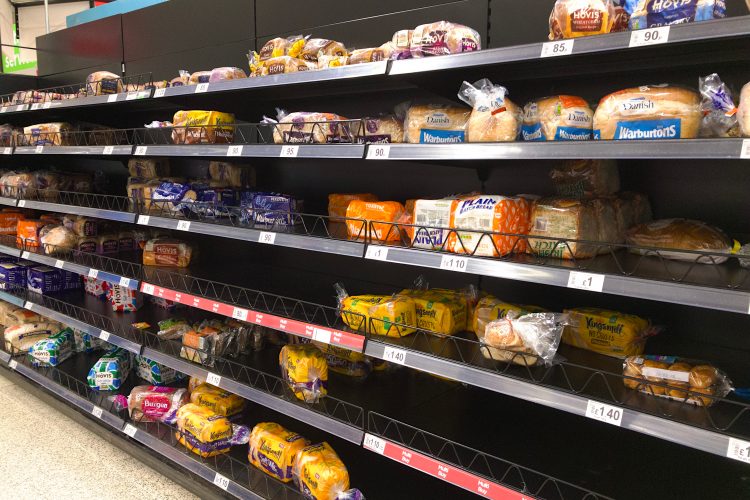Could the UK run out of bread?
- Like
- Digg
- Del
- Tumblr
- VKontakte
- Buffer
- Love This
- Odnoklassniki
- Meneame
- Blogger
- Amazon
- Yahoo Mail
- Gmail
- AOL
- Newsvine
- HackerNews
- Evernote
- MySpace
- Mail.ru
- Viadeo
- Line
- Comments
- Yummly
- SMS
- Viber
- Telegram
- Subscribe
- Skype
- Facebook Messenger
- Kakao
- LiveJournal
- Yammer
- Edgar
- Fintel
- Mix
- Instapaper
- Copy Link
Posted: 4 April 2022 | Abi Sritharan (New Food) | No comments yet
The Federation of Bakers’ Chief Executive has called for the government to help prevent an imminent “bread crisis”.


Will we see bread shelves beginning to empty?
The Federation of Bakers (FOB) has called for the UK government to take action in order to avert an impending bread crisis.
The FOB is the trade association representing the largest bakeries in the UK, who produce sliced and wrapped bread, bakery snacks and other bakery products.
Gordon Polson, Chief Executive of the association, has written to the Secretary of State for Environment, Food and Rural Affairs, calling for action on the pressing issues facing UK bakery businesses. The challenges being faced by the baking industry can, in part, be put down to rising energy prices and uncertainty over raw material supplies.
“There is no intention to scaremonger,” said Polson, “but what the baking industry is facing over the next six months, with cost increases and uncertainty, has never been experienced in a generation, if indeed, ever before.”
In his letter, the Chief Executive stated that raw material and energy shortages could lead to the prospect of bread being unavailable. He added that he supports the call for a Food Security Council to be established, and some recognition of the “relentless increase in costs”, in particular, energy. Cost increases will lead to large bread price increase, putting some bakeries viability into question, according to Polson.
He also said in his letter that in a short space of time, the UK bakery sector has continued to operate with “as much continuity as feasible, in an extremely challenging environment following Brexit, COVID and the invasion of Ukraine”.
While the UK does not rely on Russian or Ukrainian wheat, the loss of supply from these countries is having a huge impact on global supply, according to Polson. Wheat that is available may be diverted – for example Russian wheat to China – which causes shortages in the EU. To mitigate shortages, the EU may then decide to stop its exports causing the UK to have huge supply chain disruption, he explained.
“We estimate that even if the war stopped soon, the disruption to the planted Ukraine wheat, the lack of planting of spring wheat and the Russian sanctions, it would take an estimated three years before the harvest cycle returns to normal. It is the case that all businesses will not be experiencing the same price increases and uncertainty at the same time, but once the northern hemisphere harvest is gathered, we can be sure of settled high prices across the industry.”
The FOB requests the government “acknowledge the challenges and start planning for disruption and consider mitigating factors”. The group also calls for “maximum flexibility in labelling, allergen labelling excluded, if an ingredient is not avoidable or not in the product, for a seed in a mix seeded loaf”.
“FOB members are working very hard with suppliers to do all we can to mitigate the well-publicised cost increases in energy and wheat, but it is inevitable that prices will have to rise. Almost as equally concerning, is the challenge of uncertainty over the availability,” concluded Polson.









